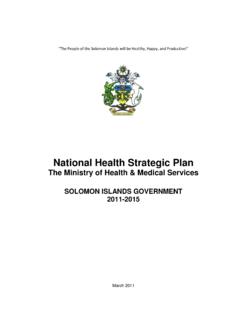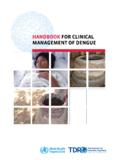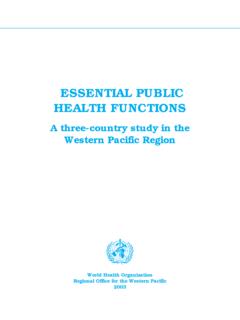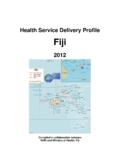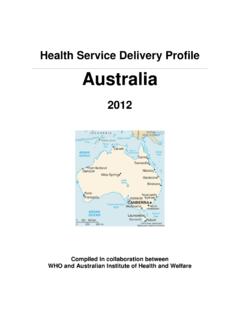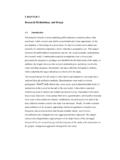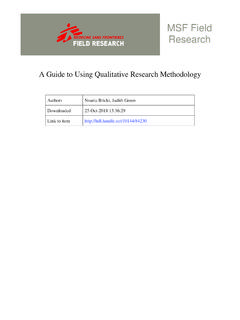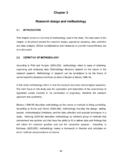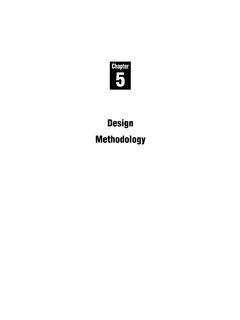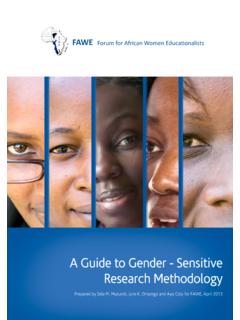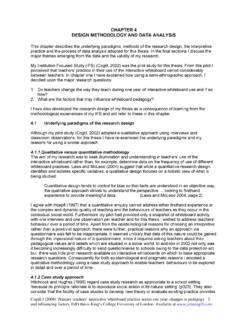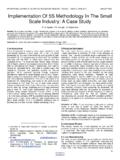Transcription of HEALTH RESEARCH METHODOLOGY - WPRO
1 IHealth RESEARCH METHODOLOGY : A guide for training in RESEARCH methodsHEALTH RESEARCH METHODOLOGYA Guide for Training in RESEARCH MethodsSecond EditionWORLD HEALTH ORGANIZATIONR egional Office for the Western PacificManila, 2001 CONTENTS Foreword v Introduction vii Acknowledgements ix Chapter 1: Introduction to RESEARCH 1 Chapter 2: RESEARCH strategies and design 11 Chapter 3: Descriptive epidemiological studies and clinical trials 43 Chapter 4: Experimental studies and clinical trials 55 Chapter 5: Sampling methods and sampling size 71 Chapter 6: Bias and confounding 85 Chapter 7: Basic risk measurement 97 Chapter 8: Tests of significance 107 Chapter 9: Association and causation 125 Chapter 10: Ethical aspects of HEALTH RESEARCH 141 Chapter 11: Construction of a RESEARCH proposal 147 Annexes: Annex 1: Questionnaire design 169 Annex 2: Descriptive statistics: Table, graphs, and charts 187 Annex 3.
2 Organization of a workshop on RESEARCH 211 methods in HEALTH sciences Index 232 iiHealth RESEARCH METHODOLOGY : A guide for training in RESEARCH methodsWHO Library Cataloguing in Publication DataHealth RESEARCH METHODOLOGY : A guide for training in RESEARCH methods. HEALTH services RESEARCH - RESEARCH World HEALTH Organization. Regional Office for the Western PacificISBN 92 9061 157 XThe World HEALTH Organization welcomes requests for permission to reproduce ortranslate its publications, in part or in full. Applications and enquiries should be addressedto the Office of Publications, World HEALTH Organization, Geneva, Switzerland or to theRegional Office for the Western Pacific, Manila, Philippines, which will be glad to providethe latest information on any changes made to the text, plans for new editions, andreprints and translations already available.
3 World HEALTH Organization 2001 Publications of the World HEALTH Organization enjoy copyright protection in accordancewith the provisions of Protocol 2 of the Universal Copyright Convention. All rights designations employed and the presentation of the material in this publication donot imply the expression of any opinion whatsoever on the part of the Secretariat of theWorld HEALTH Organization concerning the legal status of any country, territory, city or areaor of its authorities, or concerning the delimitation of its frontiers or mention of specific companies or of certain manufacturers products does not implythat they are endorsed or recommended by the World HEALTH Organization in preferenceto others of a similar nature that are not mentioned.
4 Errors and omissions excepted, thenames of proprietary products are distinguished by initial capital RESEARCH METHODOLOGY : A guide for training in RESEARCH methodsFOREWORDS cientific RESEARCH plays a very important role in our efforts tomaintain HEALTH and combating diseases. RESEARCH helps us createnew knowledge and develop proper tools for the use of existingknowledge. Not only does it enable HEALTH care providers to diagnoseand treat diseases, RESEARCH also provides evidence for policies anddecisions on HEALTH and and its Member States are aware of the importance ofresearch. However, HEALTH RESEARCH has not been a priority in manydeveloping countries in the Region.
5 The lack of RESEARCH methodologyand the absence of qualified researchers hinder many developingcountries to conduct HEALTH RESEARCH by themselves. In manycountries, the system for management and coordination of healthresearch has not been established or is not functioning is committed to stimulating scientific RESEARCH indeveloping countries. An articulate and clearly defined WHOframework and vision on RESEARCH and partnership with Member Stateswill strengthen RESEARCH capacity in developing countries. The WHOR egional Office for the Western Pacific has organized more than 20training courses on HEALTH RESEARCH design and METHODOLOGY in thelast two decades.
6 In 1992, the Regional Office published a trainingmanual entitled HEALTH RESEARCH METHODOLOGY : A Guide forTraining in RESEARCH Methods. Since then, the manual, well receivedby readers worldwide, has been translated into Chinese, Khmer,Laotian, Mongolian and accommodate requests from readers to incorporate recentdevelopments on RESEARCH METHODOLOGY and experiences of pasttraining courses, the manual has been revised and RESEARCH METHODOLOGY : A guide for training in RESEARCH methodsWe hope this revised version of the landmark manual will helpscientists, researchers, HEALTH practitioners and administrators to learnand practise the concepts and principles of scientific RESEARCH .
7 Theknowledge of the scientific methods will help them design and conductresearch projects with precision in their own countries. The publicationof the revised manual also reiterates our commitment to developingcountries in the Region to help them build and strengthen the healthresearch Omi, MD, DirectorWHO Western Pacific Regional OfficeviiHealth RESEARCH METHODOLOGY : A guide for training in RESEARCH methodsINTRODUCTIONThis is a revised version of an earlier manual on HealthResearch METHODOLOGY and deals with the basic concepts and principlesof scientific RESEARCH methods with particular attention to RESEARCH inthe HEALTH RESEARCH process is the cornerstone for informed andeffective decision-making, and is integral to countries efforts toimprove the HEALTH of their populations and the effectiveness of theirhealth systems, particularly during times of dramatic epidemiological,demographic.
8 And economic changes that profoundly affect healthsystems. RESEARCH on (1) HEALTH policy and HEALTH systems, (2)epidemiology dealing with noncommunicable diseases and existing,new and emerging communicable diseases, (3) reproduction, childhealth and nutrition, including domestic or sexual violence, and (4)social-behaviour, including analysis of peoples HEALTH seekingprocesses and their beliefs, knowledge and practices about healthand illness, conducted by multi-disciplinary teams will enhancedeveloping countries efforts to fight diseases and maintain HEALTH forthe manual describes methods for planning and conductingscientific RESEARCH : from formulation of problems to setting researchobjectives, to designing the study, including methods of data collection,statistical analysis as well as interpretation and dissemination of theresults.
9 The earlier manual, used as resource and guide for the conductof workshops on HEALTH RESEARCH METHODOLOGY in various countries ofthe Western Pacific Region has been expanded to include more detailson some of the commonly used statistical methods and to clarify thepoints raised during workshops. The discussion on biases has beenexpanded RESEARCH METHODOLOGY : A guide for training in RESEARCH methodsThis manual is expected to be used by the WHO Western PacificRegional Office as a reference guide in training young scientists toconduct HEALTH sciences RESEARCH . It will be used as a starting pointand not as a comprehensive textbook on RESEARCH methods.
10 Manyexcellent textbooks are available for this purpose and are referencedin the manual. We have tried to use real life examples from theRegion for illustrating the principles and methods used in the manualto make it more relevant to the regional manual will be useful in planning a RESEARCH project,especially in preparing a RESEARCH grant application for a donor particular, the attached copy of the application form of WHO servesas a guide. The issues discussed in the manual will help the researcherto focus on issues of importance before the study is proposed andundertaken.


